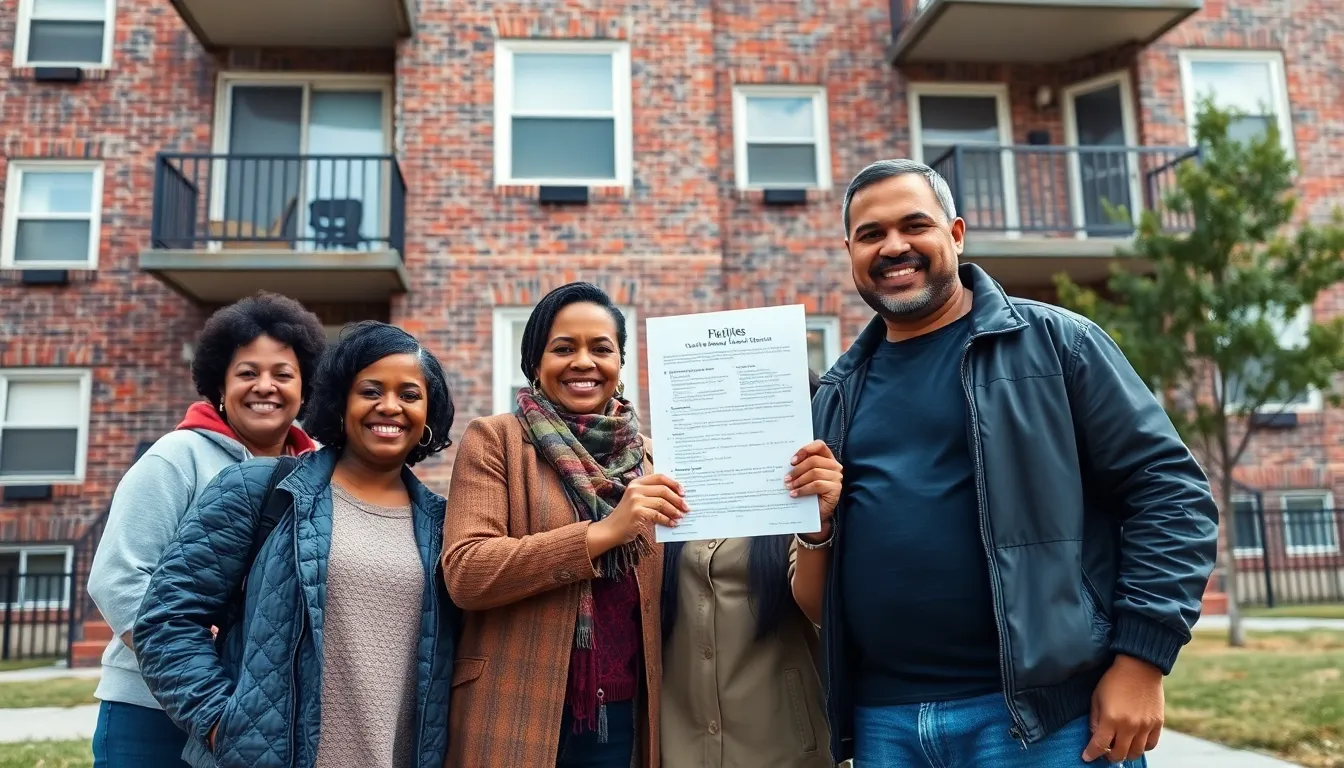Navigating the world of public housing can feel like trying to find a needle in a haystack, especially when it comes to understanding tenant rights. Just when you think you’ve got it all figured out, a new twist pops up, leaving many scratching their heads. But fear not! Shedding light on these rights isn’t just important; it’s essential for anyone looking to secure a stable and fair living situation.
From understanding lease agreements to knowing what to do when repairs go awry, public housing tenant rights are here to protect. It’s like having a superhero cape—only instead of flying, it helps you stand your ground against unfair practices. So buckle up, because this guide is about to empower tenants with the knowledge they need to navigate their rights and responsibilities with confidence and a smile.
Table of Contents
ToggleOverview of Public Housing Tenant Rights
Public housing tenants possess specific rights that protect them from discrimination and ensure safe living conditions. Understanding these rights empowers them to seek assistance and navigate challenges more effectively.
Key Legal Frameworks
The Fair Housing Act prohibits discrimination in housing based on race, color, national origin, religion, sex, familial status, or disability. The U.S. Department of Housing and Urban Development (HUD) oversees these laws, making compliance essential for housing authorities. Additionally, local and state laws may provide further protections, addressing issues like rent control and eviction processes. Legal frameworks vary by location, so tenants must familiarize themselves with both federal and local regulations.
Importance of Tenant Rights
Tenant rights play a crucial role in maintaining housing stability. Recognizing these rights allows tenants to advocate for their needs, such as timely repairs or addressing unsafe living conditions. Tenants with knowledge of their rights can combat unfair practices, fostering a healthier landlord-tenant relationship. By understanding legal protections, they gain confidence when dealing with disputes or seeking redress. Overall, knowing tenant rights enhances the security and well-being of public housing residents.
Common Rights of Public Housing Tenants
Public housing tenants possess several essential rights that protect their living conditions and ensure fair treatment. Understanding these rights empowers tenants to advocate for themselves effectively.
Right to Safe and Habitability Standards
Safe living environments are a fundamental right for public housing tenants. Properties must meet safety standards, ensuring adequate heating, plumbing, and structural integrity. HUD mandates that public housing authorities address significant health hazards. Tenants can request repairs when issues arise, and landlords must respond promptly within specified timeframes. Failure to maintain a safe environment may allow tenants to pursue legal remedies or file complaints with local housing authorities.
Right to Privacy
Tenants in public housing have a right to privacy within their homes. Landlords must provide notice before entering a unit, except in emergency situations. The law protects tenants from unwarranted surveillance or harassment by landlords. Retaliation for exercising this right is prohibited, ensuring tenants can enjoy their living space without undue interference. Tenants can assert their privacy rights by communicating concerns directly to their landlord or seeking assistance from legal organizations if necessary.
Responsibilities of Public Housing Authorities
Public housing authorities play a crucial role in maintaining tenant rights. They hold significant responsibilities to ensure a safe and equitable living environment for residents.
Maintenance Obligations
Public housing authorities must address maintenance issues promptly. They are responsible for ensuring properties meet safety and health standards. Tenants should report repair needs, and authorities must respond within a reasonable timeframe. Authorities are obligated to maintain plumbing, heating, and electrical systems. Pest control services also fall under their purview. Regular inspections ensure compliance with safety regulations. When authorities neglect these duties, tenants can seek remedies through local housing agencies.
Fair Treatment Policies
Public housing authorities must uphold fair treatment policies. Discrimination based on race, color, national origin, religion, sex, familial status, or disability violates the Fair Housing Act. They should implement policies that promote equal access to housing resources. Complaint procedures should be straightforward for tenants facing discrimination. Training for staff on fair housing laws is essential to ensure compliance. Authorities must also provide reasonable accommodations for tenants with disabilities. Transparency in operations leads to a more equitable housing environment.
Advocacy and Resources for Tenants
Public housing tenants can find essential support through various advocacy resources. These organizations empower tenants to understand and assert their rights effectively.
Local and National Organizations
Several local and national organizations provide assistance for public housing tenants. For example, the National Low Income Housing Coalition offers resources for tenants to connect with advocacy groups in their areas. Local tenant unions frequently promote tenant rights and offer educational workshops. Community action agencies may also provide financial assistance and counseling. Additionally, organizations like Legal Services Corporation focus on housing issues, helping tenants navigate complex legal landscapes. Engaging with these groups enhances tenants’ understanding and access to their rights.
Legal Aid Options
Legal aid organizations offer critical support to tenants facing housing challenges. They assist with disputes related to leases, evictions, and discrimination. Local legal aid offices often provide free or low-cost legal representation, ensuring tenants understand the laws affecting them. Many states have bar associations that maintain directories of legal aid resources specific to housing issues. Moreover, national resources like the Legal Services Corporation connect tenants to free legal counsel. Accessing these services equips tenants with knowledge and representation, significantly improving their chances of resolving housing issues.
Challenges Faced by Public Housing Tenants
Public housing tenants encounter various challenges that can impact their living conditions and rights. Understanding these issues promotes awareness and helps tenants navigate their situations effectively.
Discrimination Issues
Discrimination remains a significant issue for public housing tenants. Tenants often face bias based on race, ethnicity, gender, or disability when seeking housing. The Fair Housing Act prohibits such practices, ensuring that housing opportunities are open to everyone. Many tenants may not report discrimination out of fear of retaliation or being evicted. Awareness of local and federal regulations can empower individuals to confront unfair treatment and seek assistance. Organizations like the National Fair Housing Alliance provide resources and support for those experiencing discrimination. Advocating for one’s rights often leads to better outcomes and contributes to fair housing practices.
Eviction Threats
Eviction threats present another pressing concern for public housing tenants. Various reasons, such as missed rent payments or lease violations, can trigger eviction proceedings. Tenants often feel insecure, fearing they might lose their homes. Public housing authorities must follow specific legal processes to evict tenants, including providing proper notice and an opportunity to contest the eviction. Understanding these rights is crucial for tenants facing eviction. Legal aid organizations frequently offer support in navigating eviction cases, helping tenants understand their options. By accessing these resources, tenants can assert their rights and potentially avoid eviction, securing their stability in public housing.
Conclusion
Empowering public housing tenants with knowledge of their rights is vital for fostering a secure living environment. By understanding their protections against discrimination and ensuring safe conditions, tenants can confidently advocate for themselves. Engaging with local and national resources further enhances their ability to navigate complex housing issues.
Awareness of both federal and local regulations equips tenants to tackle challenges like eviction threats and unfair treatment. With the right information and support, tenants can assert their rights effectively and work towards a more stable housing situation. The journey towards equitable living conditions begins with informed tenants ready to stand up for their rights.







